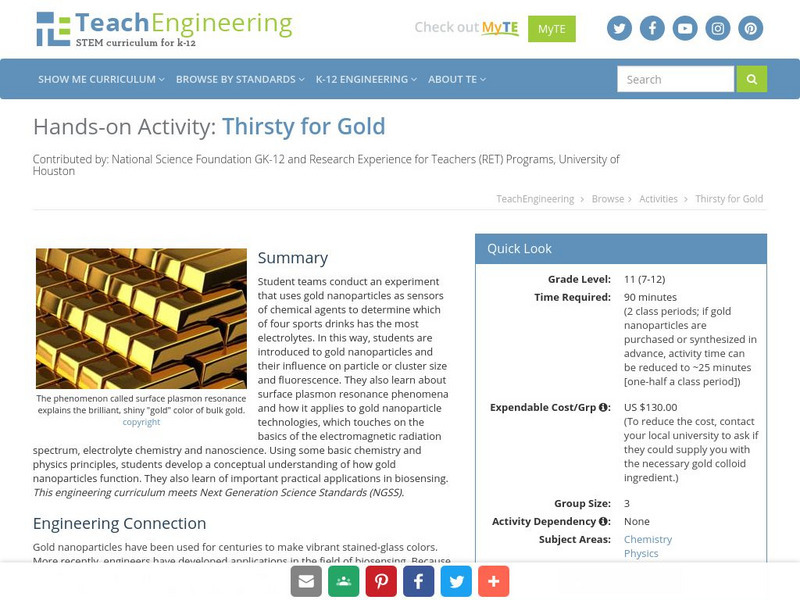Hi, what do you want to do?
University of New South Wales (Australia)
University of New South Wales: Introduction to Acoustics of Brass Instruments
Discover the acoustical properties of brass instruments from this well researched site provided by the University of New South Wales. Everything from lip control to bell shape is discussed as it applies to frequencies and harmonics.
TeachEngineering
Teach Engineering: Thirsty for Gold
Student teams conduct an experiment that uses gold nanoparticles as sensors of chemical agents to determine which of four sports drinks has the most electrolytes. In this way, students are introduced to gold nanoparticles and their...
University of Sydney (Australia)
Thermal Physics Module/temperature and Heat [Pdf]
A lengthy set of lecture notes on the distinction between heat and temperature. The science of thermography is introduced; the Kelvin temperature scale is explained and compared to the Celsius temperature scale. The meaning of a triple...
National High Magnetic Field Laboratory
Magnet Academy: Jack Kilby
The integrated circuit fueled the rise of microelectronics in the latter half of the twentieth century and paved the way for the Information Age. An American engineer, Jack Kilby, invented the integrated circuit in 1958, shortly after he...
Open Curriculum
Open Curriculum: Analysis of Forces
This study information helps students apply Newton's third law and understand forces.
Open Curriculum
Open Curriculum: Conservation of Momentum
This article helps students understand and apply Newton's third law and the conservation of momentum.
Open Curriculum
Open Curriculum: Gravity
This article helps students understand and apply the concept of gravity and Newton's Laws.
ClassFlow
Class Flow: Electricity
[Free Registration/Login Required] Students can use this Flipchart to learn and apply Ohm's law to basic circuitry problems. Students are introduced to the relationship among voltage, current, and resistance, and then apply their newly...
Cosmo Learning
Cosmo Learning: Introduction to Astrophysics
A collection of audio lectures from an introduction to astrophysics course taught at the University of California, Berkeley. The course discusses the solar system, stars, quantum mechanics, gravitation, and cosmology focusing on how...
Khan Academy
Khan Academy: Angular Momentum and Angular Impulse Review
Reference material that reviews how objects rotate and can have linear momentum and angular momentum. Also, learn how the angular momentum of an object can change when torque is applied to an object over time.
Khan Academy
Khan Academy: Conservation of Angular Momentum Review
Review how angular momentum is conserved if there is no external torque applied to a system. Specific scenarios are highlighted: system changing it rotational inertia, orbiting bodies, and rotational collisions.
Khan Academy
Khan Academy: Gravitational Potential Energy at Large Distances Review
Review the equations and skills related to gravitational potential energy at large distances, including how to apply conservations laws to objects in orbit.
TeachEngineering
Teach Engineering: Waves: The Three Color Mystery
Students are presented with a challenge question concerning color blindness and asked to use engineering principles to design devices to help people who are color blind. Using the legacy cycle as a model, this unit is comprised of five...
Curated OER
Educational Technology Clearinghouse: Clip Art Etc: Galileo Galilei
Galileo Galilei (15 February 1564 - 8 January 1642) was a Tuscan (Italian) physicist, mathematician, astronomer, and philosopher who played a major role in the scientific revolution. His achievements include improvements to the telescope...
Science Education Resource Center at Carleton College
Serc: Investigating Projectile Motion: Creating a Catapult
This lesson is for 9th grade physical science students. It begins with an inquiry-based lesson using a projectile motion computer simulation. It culminates with students building a catapult; applying and connecting science knowledge from...
Symmetry Magazine
Symmetry Magazine: Explain It in 60 Seconds: A Theory
The definition of a theory as it applied to science is explained in this brief article. "Explain It In 60 Seconds" is an article series that aims to summarize in a few paragraphs the meaning of different concepts in particle physics.
Alabama Learning Exchange
Alex: Force and Motion
In this lesson, the students will work across the curriculum using technology, business education, and mathematics. They will form a company and use the physics of force and motion to build a hovercraft. The students will use this...







![Thermal Physics Module/temperature and Heat [Pdf] Handout Thermal Physics Module/temperature and Heat [Pdf] Handout](https://static.lp.lexp.cloud/images/attachment_defaults/resource/large/FPO-knovation.png)










